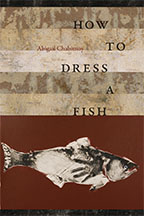 In How to Dress a Fish, poet Abigail Chabitnoy, of Unangan and Sugpiaq descent, addresses the lives disrupted by US Indian boarding school policy. She pays particular attention to the life story of her great grandfather, Michael, who was taken from the Baptist Orphanage, Wood Island, Alaska, and sent to Carlisle Indian Industrial School in Pennsylvania. Incorporating extracts from Michael’s boarding school records and early Russian ethnologies—while engaging Alutiiq language, storytelling motifs, and traditional practices—the poems form an act of witness and reclamation. In uncovering her own family records, Chabitnoy works against the attempted erasure, finding that while legislation such as the Alaska Native Claims Settlement Act reconnects her to community, through blood and paper, it could not restore the personal relationships that had already been severed.
In How to Dress a Fish, poet Abigail Chabitnoy, of Unangan and Sugpiaq descent, addresses the lives disrupted by US Indian boarding school policy. She pays particular attention to the life story of her great grandfather, Michael, who was taken from the Baptist Orphanage, Wood Island, Alaska, and sent to Carlisle Indian Industrial School in Pennsylvania. Incorporating extracts from Michael’s boarding school records and early Russian ethnologies—while engaging Alutiiq language, storytelling motifs, and traditional practices—the poems form an act of witness and reclamation. In uncovering her own family records, Chabitnoy works against the attempted erasure, finding that while legislation such as the Alaska Native Claims Settlement Act reconnects her to community, through blood and paper, it could not restore the personal relationships that had already been severed.
ABIGAIL CHABITNOY is a poet of Unangan and Sugpiaq descent and a member of the Tangirnaq Native Village in Kodiak, Alaska. She received her MFA at Colorado State University, where she was an associate editor for Colorado Review. Her poems have appeared in Hayden’s Ferry Review, Tin House, Gulf Coast, Pleiades, Tinderbox Poetry Journal, Nat Brut, Red Ink, and Mud City.
“Never before have readers been of a mind to apprehend such prodigious poems. Determined by the wealth and control of their poet’s language and the most profound respect for the powers of history, this work insists upon the necessity of poetry. Poems like these change the world, connecting us to each other and all else that sustains life. Herein, the lyric bones are barbed and all the crafts, laden. Not in division, but through the responsibility and gifts of this most crucial poet: Abigail Chabitnoy. With her poems, together we may, as real people, spring from and return to the islands, the sea, and the ice with utmost elegance. Traveling together, and most attentive to our context.” – Joan Naviyuk Kane, 2018 Guggenheim Fellow in Poetry
“How to Dress a Fish is a stunning investigation of archive, loss, and kinship. These poems linger in histories erased by US colonialism—not toward recovery, but to study those modalities of mourning, attachment, and invention through which living proceeds nonetheless.” – Matt Hooley, assistant professor of English, Clemson University






